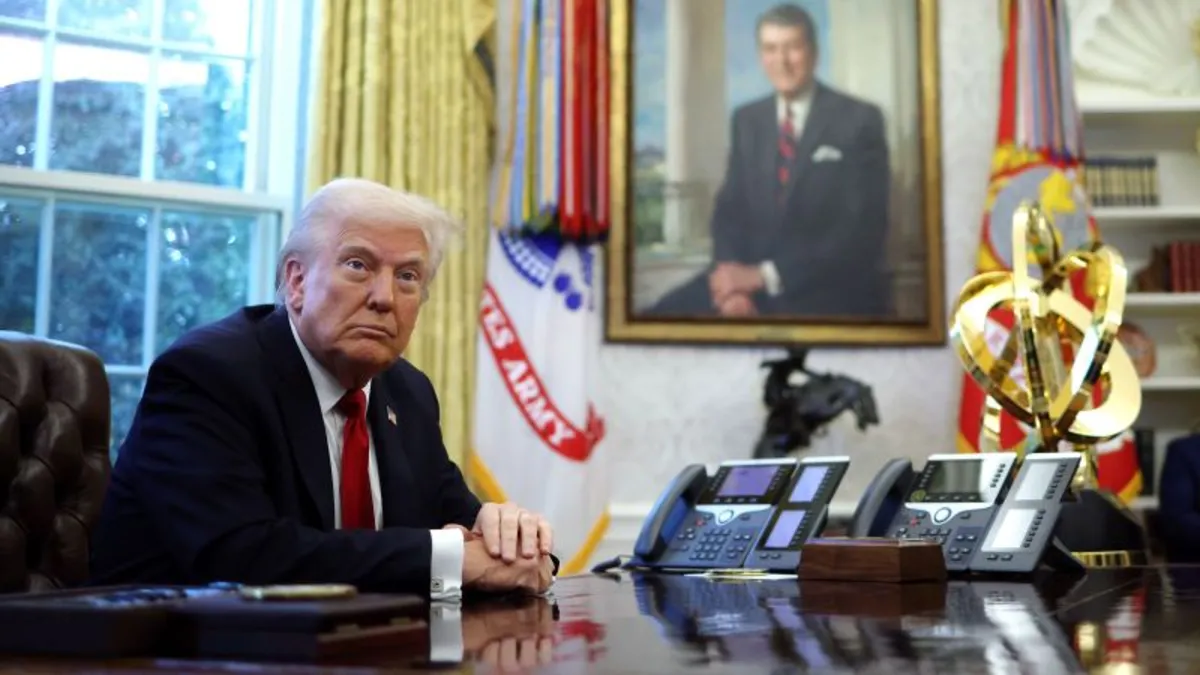
President Donald Trump is poised to bet the success of his second term, the overall economy, and the personal finances of millions of Americans on his long-standing belief that imposing tariffs can usher in a golden age of U.S. wealth and independence. However, the unpredictability of Trump's leadership leaves many questions unanswered until decisions are finalized. His recent proclamations indicate that Wednesday, April 2, will be dubbed “Liberation Day,” when he intends to impose reciprocal dollar-for-dollar tariffs on nations that levy duties on U.S. goods.
This bold move represents Trump's most ambitious effort yet to reshape the global trading landscape, with ramifications that could touch every American household, potentially raising prices during a time when family budgets are already stretched thin. The President is essentially asking the public to buy into a strategy that promises enticing future benefits but demands sacrifices in the present. Trump's trade policies have already led to a significant downturn in the stock market—evidenced by the Dow Jones Industrial Average's sharp decline of 700 points last Friday—and have heightened concerns about an impending recession as consumer confidence wanes.
Moreover, Trump's approach has alienated key U.S. allies, putting his foreign policy at odds with the established Western alliances. As the deadline approaches, the President's contradictory messaging—suggesting that some countries or industries might receive exemptions from the new tariffs—further erodes the confidence necessary for economic stability. This inconsistency in leadership could cause as much harm as the policies themselves.
Trump's rationale is that by imposing tariffs on imports, he will compel companies to relocate their manufacturing and supply chains back to the United States, thereby creating jobs and revitalizing regions devastated by globalization. However, the downside is that these tariffs will drive consumer prices higher, further straining families who are already grappling with a high cost of living. There is no assurance that companies will actually return production to the U.S., as such a transition would likely take years and could extend beyond Trump's presidency.
Should he proceed with these plans, the political risks are immense. In a recent interview with NBC News, Trump expressed indifference towards potential increases in car prices due to his planned industry tariffs. He stated, “I couldn’t care less if they raise prices, because people are going to start buying American-made cars.” This cavalier attitude may incite political backlash, especially as Republicans are increasingly concerned about the electoral consequences of a sluggish economy.
Trump's perspective overlooks the intricate nature of the 25% auto tariffs set to take effect this week. Many manufacturing processes are closely tied to operations in Mexico and Canada, meaning that most cars produced in the U.S. will become more expensive. While U.S.-made cars could theoretically be exempt from tariffs, the increased production costs and investments required to establish manufacturing solely within the United States will inevitably be passed on to consumers. Consequently, prices for new cars could see significant hikes, potentially leading to job cuts in the industry.
Trump's conviction in the power of tariffs stems from his belief in a binary system of winners and losers, fueled by the notion that the U.S. has been unfairly treated by foreign powers that protect their own industries. He stated, “We’re going to charge countries for doing business in our country and taking our jobs, taking our wealth.” While tariff policy has deep historical roots in America, many economists argue that restrictive trade practices contributed to the immense hardships experienced during the Great Depression and that the post-World War II era saw a gradual reduction in trade barriers.
Trump dismisses the economic consensus that tariffs lead to higher prices as importers pass additional costs onto consumers. This is particularly concerning given that voters have seen little relief from price hikes on essential goods in recent years, even as inflation has shown signs of easing. The goal to revive economic opportunities in areas devastated by factory losses is commendable, but the reality is that globalization has caused significant pain, stripping communities of prospects.
While Trump’s vision of resurrecting a 1950s-style manufacturing economy may resonate with some, it is a challenging prospect in an era where the U.S. competitive edge lies within service industries and technology, particularly with the rise of artificial intelligence. Although other economies, like Canada, might suffer in a trade war with the U.S., they could still wield significant influence over American consumers.
The President’s erratic behavior—such as shifting deadlines and policy reversals—adds to the uncertainty and may deter manufacturers from returning to the U.S. There are also doubts about whether Trump is genuinely committed to long-term economic reform, as he may prioritize short-term negotiations over sustainable change.
Despite the optimistic rhetoric from administration officials, skepticism remains regarding whether tariffs can deliver on their promises of job creation and lower prices for American consumers. Peter Navarro, the White House senior counsel for trade and manufacturing, predicts that the tariffs will yield over $100 billion solely from autos, with hopes of revitalizing domestic production. However, many investors and consumers are already questioning the trustworthiness of Trump's approach, especially given the volatility that has characterized his leadership.
As the situation unfolds, the coming days could prove to be tumultuous for both the economy and Trump's administration as they navigate the complexities of a one-man experiment with global trade.